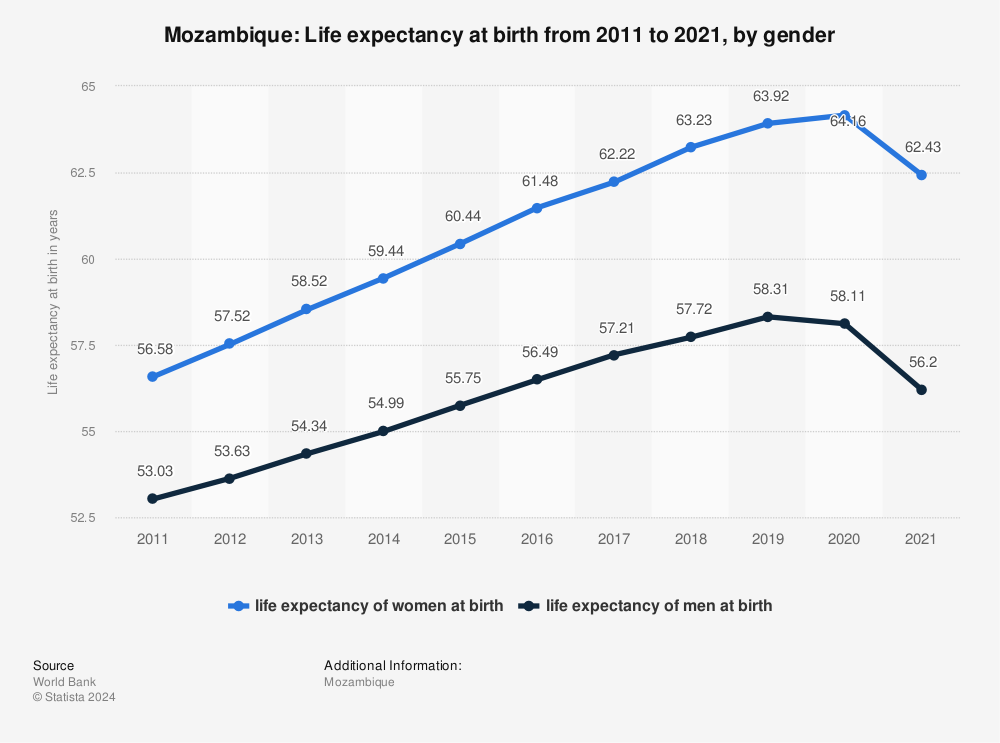Life Expectancy at Birth in Mozambique
Life Expectancy at Birth in Mozambique
Definition: Life expectancy at birth represents the average number of years a newborn is expected to live if current mortality rates remain constant throughout their lifetime. It is a critical indicator of the overall health and well-being of a population.
Current Status in Mozambique: As of the most recent data, life expectancy at birth in Mozambique has been improving, yet it remains relatively low compared to global averages. According to the World Health Organization (WHO) and World Bank data:
- Life Expectancy at Birth (2021):
- Overall: 60.0 years
- Male: 58.3 years
- Female: 61.8 years
Historical Trends: Life expectancy in Mozambique has seen progress over the past decades. In the 1990s, life expectancy was significantly lower, attributed to higher rates of infectious diseases, malnutrition, and inadequate healthcare infrastructure. Efforts to improve healthcare access, vaccination programs, and better management of HIV/AIDS and malaria have contributed to recent improvements.
- 1990: Approximately 45 years
- 2000: Approximately 47 years
- 2010: Approximately 50 years
Key Factors Influencing Life Expectancy in Mozambique:
- HIV/AIDS Epidemic:
- Mozambique has a high prevalence of HIV/AIDS, which significantly impacts life expectancy. In 2020, approximately 2.1 million people were living with HIV.
- Malaria:
- Malaria remains a leading cause of morbidity and mortality. Efforts to distribute insecticide-treated nets and antimalarial medications are ongoing to reduce its impact.
- Healthcare Access:
- Access to healthcare services remains limited, particularly in rural areas. Infrastructure improvements and increased number of healthcare professionals are crucial for further advancements.
- Maternal and Child Health:
- High rates of maternal and child mortality play a significant role. Efforts to improve prenatal and postnatal care are essential for enhancing life expectancy.
- Nutrition:
- Malnutrition affects a significant portion of the population, especially children under five. Programs aimed at improving food security and nutrition education are critical.
Mozambique: Life expectancy at birth from 2011 to 2021, by gender
Let's discuss life expectancy and notice some trends we can see from 2021 data about Mozambique. Life expectancy is an estimate of how long the average person is expected to live when they're born, assuming that the death rates at their birth stay the same throughout their life.
In 2021, something concerning happened: life expectancy in Mozambique went down for everyone—men, women, and the average for all genders. This isn't what we want to see, as increasing life expectancy usually means people are living healthier, better lives.
Women in Mozambique had a higher life expectancy at birth—62.43 years, compared to men, who had a life expectancy of 56.2 years at birth. That's a difference of 6.23 years, with women living longer on average than men.
Why might women live longer? There can be various reasons, including biological factors, lifestyle choices, the types of jobs men and women do, and access to healthcare.
A decline in life expectancy is something that health officials and government leaders pay close attention to, as it might point to emerging health problems or other societal issues that need addressing. This could mean they need to put more resources into healthcare or tackle specific problems that are causing mortality rates to rise.
